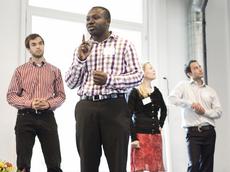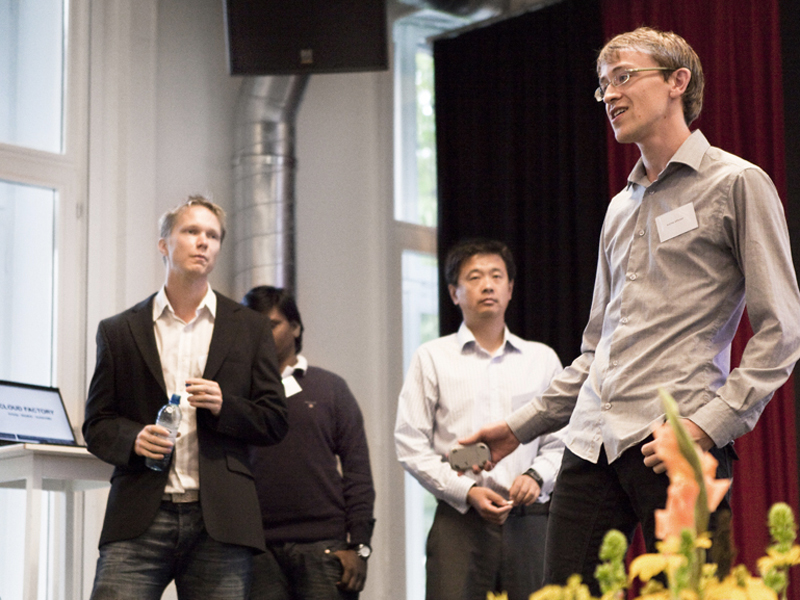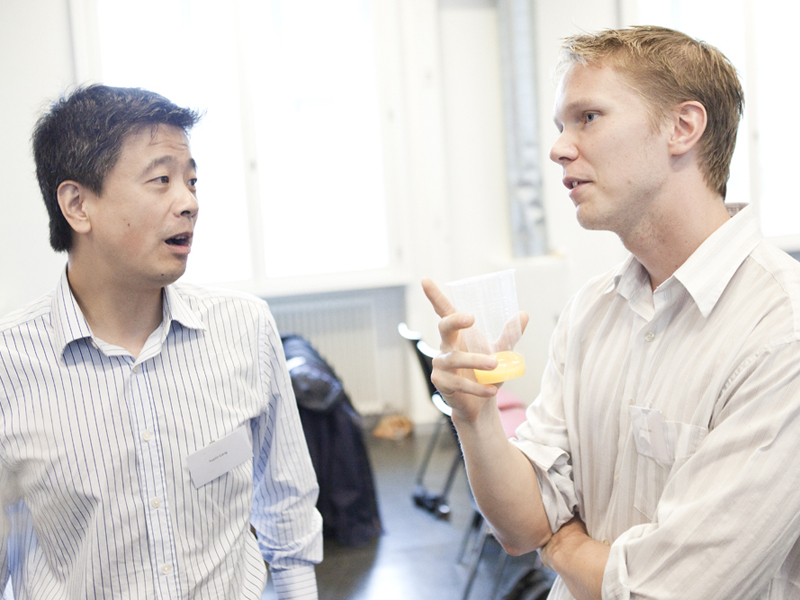Fresh business ideas for a healthy climate
With good ideas, there's money to be made in the fight against climate change. The participants at the first "Climate-KIC Summer School" are convinced of this. In August, the students presented their business ideas before a jury at ETH Zurich.

The last six weeks have been exhausting – that's the general consensus among the 46 participants in the first 'Climate-KIC Summer School'. Though, there's no sign of fatigue in student function room 'StuZ²', in the ETH chemistry building. Quite the opposite: if anything, the KIC participants seem impatient. They're eager to present their business ideas to their peers and the jury.
Students from 17 countries have spent six weeks during July and August working on questions relating to climate change. They started off in Paris, where climate scientists at ParisTech let them into their labs and showed them the latest climate models: "We were able to experiment with the models ourselves and see how they work. There's no better way to really find out what climate problems are all about", says Erkka Ryyänen from Finland. After two weeks in Paris, the participants moved on to London, where the focus was on the economic issues associated with climate change. The information on this came from a well-respected authority: Nicholas Stern, the famous author of the Stern Report, gave the participants a private lecture. And the students have spent the past two weeks in Zurich, where they've been discussing first and foremost how to finance their own business ideas. "It's been a very intense time", explains Ryyänen. "Sometimes we were working twelve hours a day on our topics, and in the process we've also learned a huge amount from each other".
A tidal wave of ideas to combat CO2
August 12 in StuZ², the students presented their own business ideas which they had devised and worked on in groups of four to six over the preceding three weeks. The result was a three-hour tidal wave of ideas aimed at helping to cut CO2 emissions, the main culprits in climate change. One example is a new technology that uses cow dung to generate electricity and produce fuel. Or how about electric scooters for Zurich, that can be borrowed at stations all over the city and returned later on? By its own calculations, 'Electric Feel' thinks it can turn over EUR 22 million a year in Zurich alone with this scheme. But the high initial investment costs involved in setting up the infrastructure for the idea could prove to be the undoing of this start-up company.
The 'DeCo!' group is pursuing a less cost-intensive business idea. The group wants to help farmers in Ghana largely replace chemical fertilisers with organic fertilisers. This would avoid environmentally unfriendly methane and nitrogen oxide emissions, and at the same time improve the farmers' yields, the team explains. 'DeCo!' is also an example of how, during the Summer School, business ideas and the new groups came together independently: Christoph Schmitz, an agricultural economics student from Germany, was in Ghana himself for a project some time ago. He put forward the idea of the organic fertiliser in the plenum, and as luck would have it another student, Stephen C. Opuni, was from Ghana. In addition to his expertise in forestry, Stephen is also the expert on the local culture and conditions in the country. Christoph and Stephen were joined by a chemist, an environmental scientist and a climate engineer. "Over the past three weeks, the project has developed to such an extent that we actually want to make 'DeCo!' a reality", explains Katja Halbritter, a Masters student at ETH Zurich. With an initial trial field requiring seed money of just EUR 25,000 and a minimum of workers, the obstacles to this scheme are relatively small.
Linking greenhouses with data processing centres
The students present their business ideas so convincingly that it's easy to believe they will really make them happen. The teams had carried out a thorough investigation of responsibilities, vacancies still be filled, marketing and financing. Nonetheless, the seven-person jury of representatives from universities and business didn't stint on the probing questioning: were the overhead costs included in the profit calculations? And who exactly owns the rights to the new type of technology that the team is proposing to launch on a major scale?
Ultimately, the jury's favourite project was the one presented by the 'Cloud Farm' team. This five-person group proposes to use waste heat from data processing centres to heat greenhouses. Large-scale data processing centres with hundreds of computer servers currently require as much electricity as a whole village – not just for the processing power itself, but also to keep the servers cooled. As global demand for processing power is increasing steadily, and the waste heat produced is therefore also increasing, the students identified a growing market in the use of this 'waste product'. The group has calculated that over the next five years, the reduction in energy consumption by greenhouses could reduce CO2 emissions by 80,000 tonnes. According to Nicolas Gruber, Professor of Environmental Physics at ETH Zurich and a member of the jury, the project won on the strength of, among other features, the high potential for reducing CO2. Further criteria set by the jury were the thoroughness of the business plan presented, and the presentation itself. Choosing a winner was a hugely difficult task, says Gruber: "We were amazed by the quality of the presentations. All the groups had really worked hard on their topics, and you could see that the students were totally committed to their projects". For Gruber, this means all the teams were winners, even if, in the end, they were not awarded a symbolic gift like the 'Cloud Farm' team.
Climate-KIC
Climate-KIC is an initiative of the European Institute of Innovation and Technology (EIT). By creating partnerships among industry, universities and public bodies, this initiative promotes innovations that help mitigate climate change. The initiative was set up in December 2009. On the academic side, in addition to ETH Zurich and Imperial College London, members of the initiative include a consortium in Paris led by the IPSL and ParisTech together with CEA, a consortium in the Berlin area led by the Potsdam Institute for Climate Impact Research and TU Berlin, and a Dutch consortium consisting of the University of Utrecht, Delft University of Technology, and the University of Wageningen. This was the first year the Summer School had been held for. All Masters and PhD students enrolled at a European university were eligible to apply.









READER COMMENTS